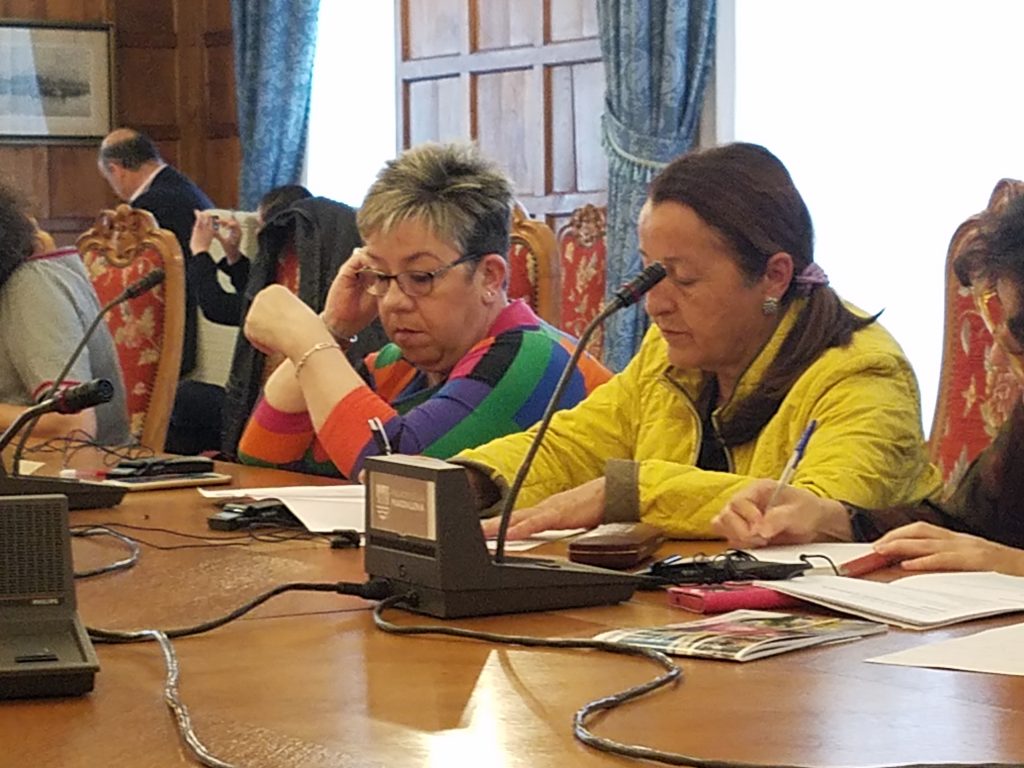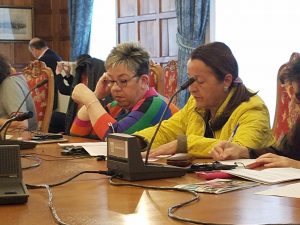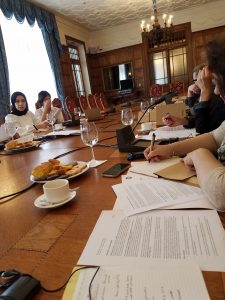
 Around the world, gender-based violence, pay inequity, and a lack of diversity in newsroom management are pressing matters. In late May, about 30 journalists gathered at a Gender Conference in Santander, Spain, to explore what must be done.
Around the world, gender-based violence, pay inequity, and a lack of diversity in newsroom management are pressing matters. In late May, about 30 journalists gathered at a Gender Conference in Santander, Spain, to explore what must be done.
Sponsored by the International Federation of Journalists, we met in the Magdalena Palace— originally built for Spanish royalty—to explore recommendations to share with the IFJ, a global network of journalists.
“We are being discriminated against,” said Marta Barcenilla, president of FSC CCOO, a Spanish union. It recently launched an initiative for members to wear black on Fridays in solidarity with female broadcasters who are sexually harassed and/or paid less than their male counterparts. “I hope nobody thinks they have to give up being a woman in order to be a [successful] manager,” she added.
Barcenilla’s research appears to mirror conditions around the world, from the US to the United Kingdom, where a woman’s pay in journalism drops considerably after she has a child. If she is sexually harassed and speaks out, she is often not disbelieved or vilified.
 Italian journalist Alessandra Mancuso urged us to be aware of gender biases in our own writing. She suggested we use the word “femicide” to describe killings of women as opposed to “homicide.” Why? By being more specific, journalists can raise awareness often overshadowed by subversive language, which sometimes blames women for their own deaths.
Italian journalist Alessandra Mancuso urged us to be aware of gender biases in our own writing. She suggested we use the word “femicide” to describe killings of women as opposed to “homicide.” Why? By being more specific, journalists can raise awareness often overshadowed by subversive language, which sometimes blames women for their own deaths.
“If we’re going to [address these issues], all forms of violence against women must be tackled,” says Mindy Ran, co-chair of the IFJ Gender Council. “That includes all these people who enforce indirect violence, as well as targeted violence and sexual harassment,” said Ran, an American who lives in the Netherlands.
Though the #MeToo and #TimesUp movements have made their way from the US abroad, the way other nations fight these battles requires a nuance sensitive to each country’s cultural and political standards. The Gender Conference offered guidance along these lines.
 Many delegates relayed sobering tales of being stalked on Facebook or Twitter, paired with low pay and low (or no) pensions for women. Meanwhile, female freelancers reported not being paid, not being paid on time, and/or being paid less than men, which undermines their efforts to provide for their families.
Many delegates relayed sobering tales of being stalked on Facebook or Twitter, paired with low pay and low (or no) pensions for women. Meanwhile, female freelancers reported not being paid, not being paid on time, and/or being paid less than men, which undermines their efforts to provide for their families.
Several delegations, including those from Russia, Kuwait and Italy, gave progress reports on gender/journalism issues in their countries. Rabeaa Al Juma, an editor in Kuwait, reported that the subject of increased female leadership is a “politically sensitive issue,” but that her colleagues enjoy considerable press freedoms.
Natalya Golosnova of the RUJ in Russia said that more than half of their union members are women, and Facebook stalking and criticism of private posts is a major problem.
As a group, we drafted the Santander Declaration of 2018, demanding that changes be implemented quickly, as good journalism depends upon it. The president of the Spanish Journalists Association joined us, as did the mayor of Santander, a colorful port city about 200 miles north of Madrid. Our  location faced the sea, and we enjoyed espresso service and daily tapas to keep us going, listening to conversations translated into either English or Spanish.
location faced the sea, and we enjoyed espresso service and daily tapas to keep us going, listening to conversations translated into either English or Spanish.
Between discussions, we took a group photo on the palace grounds, near the coast, which is now a government park that houses a monument dedicated to slain journalists. I bonded with colleagues from Pakistan, Germany, Italy, and Russia. We dined together, tasted the native wines of northern Spain, shared newsroom tales, and even visited an ancient Roman cathedral together. We left as friends, and now share our stories on LinkedIn and Twitter.
In solidarity there’s hope. Ran stressed that no one is alone; each of us can and should lean on the larger union for help, support, and ideas.
“You are connected to much bigger and much wider networks,” said Ran. “Collective work and collective action: As trade unionists it should be the way we breathe.”

 NWU is the sole provider of IFJ Press Passes to freelance journalists in the U.S.
NWU is the sole provider of IFJ Press Passes to freelance journalists in the U.S.